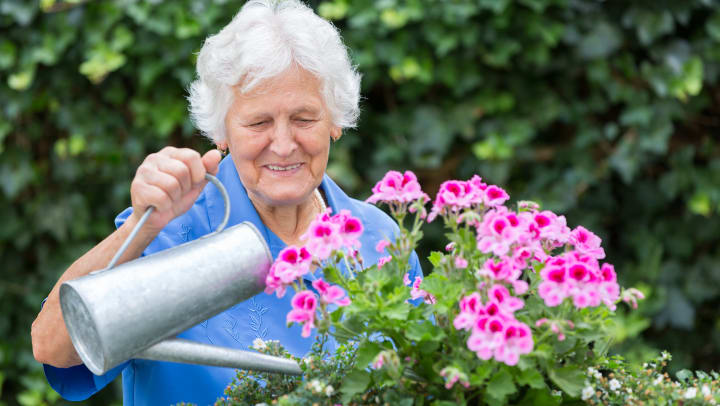One great way for older adults to stay healthy while having fun is to venture outside and grow a garden. Gardening can not only produce healthy fruits and vegetables but can also provide therapeutic benefits to gardeners by boosting their mood, supporting aerobic exercise, and exposing them to vitamin D which improves bone and immune system health.
With all of this in mind, did you know that gardening delivers additional benefits for people with dementia? The Alzheimer’s Society underscores the importance of gardening for those with dementia by stating, “For people who are living with dementia, well-being is also tied to the ability to enjoy familiar activities, and which cultivate a feeling of comfort. Garden therapy is at the top of that list.”
Five benefits of gardening for people with dementia include:
-
Increases physical activity
Gardening involves physical activities such as pulling weeds, planting seeds, digging, watering plants, and picking fruit which maintain mobility and flexibility. In addition to physical benefits, gardening provides mental and psychosocial benefits. Studies show that exercising can reduce tension, agitation, and aggression. According to the BetterHealth Channel, exercise improves mood, sleep, motor skills, social skills, memory, and behavior while reducing constipation, risk of falls, and disease-related cognitive decline.
-
Provides a sense of purpose
Taking care of a garden provides seniors with Alzheimer’s a sense of purpose and independence. While working on the garden, there are tangible results. There is a feeling of anticipation of daffodils blooming and then satisfaction when the first cucumber is picked. Maintaining a sense of purpose is a key factor for having a better quality of life. According to a study conducted by the American Heart Society, seniors who reported a higher purpose of life had a 30% lower rate of mental decline than those who reported lower scores.
-
Exposure to vitamin D
Outdoor gardening with direct exposure to sunlight gives access to vitamin D. According to the National Institutes of Health, sunlight exposure provides adequate serum vitamin D levels for seniors which supports calcium levels. Calcium is key for both bone and immune health, particularly important for older adults.
-
Supports stimulation of the senses
Being outdoors with nature provides a sensory experience that stimulates smells, touch, and sounds that can bring back happy memories from the past. This experience can help preserve memories from childhood that can be calming, mood-boosting, and connected to the present for those with dementia. Studies published in the NIH National Library of Medicine show that gardening reduces the stress hormone cortisol more than that of other activities. Gardening activities can benefit the caregiver by reducing their stress levels as well.
-
Offers an outdoor activity in a safe place
When carefully created, a garden can provide a safe and comfortable space for those with dementia. This gives the gardener the opportunity to spend worry-free time outside. Verywell Health provides safety advice for Alzheimer’s Garden designs. A returning-path system or figure-of-eight looped path is that leads the gardener back to the house can prevent them from wandering. Gardens should contain non-toxic, non-pricking plants; be easy to navigate with wide, level paths; and be void of harmful chemicals, sharp tools, and wires.
Cultivating a garden is a healthy activity that provides physical, mental, and psychosocial benefits for those with dementia. With all these benefits in mind, help plan a garden for your loved one today.


